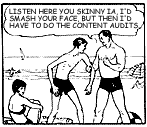We’ll be teaching a full-day seminar prior to the IA Summit called Enhancing Your Strategic Influence: Understanding and Responding to Complex Business Problems. I’ll be joined by John Zapolski and Scott Hirsch of MIG, Harry Max (formerly of Dreamworks), and Mark McCormick (Director of Design at Wells Fargo).
We’ve been designers. And we’ve partnered with companies to work through tricky business issues. Now we want to return to the design community and teach the many skills we’ve learned.
Here’s the official description:
While the skill level of the average information architect has increased dramatically over the last several years, many IAs still lack the tools necessary to understand and articulate the broader implications of their work within a complex and dynamic business environment. The most successful information architects are better at recognizing the roots of strategic change and opportunity, assessing the potential impacts on their organization, and determining what to do and who to involve in getting it done.
This workshop introduces participants to a new way of thinking about cause and effect in complex organizations—within functional groups, across departments, beyond business units, and across industries. Participants come away with a set of tools to identify social, cultural, economic, and technological change, match products to emerging and changing markets, develop strategies to capture market value, and change organizational capabilities to reflect changing market and technological dynamics. Special attention is given to learning how to create and maintain a workplace and culture that facilitate and sustain innovation and change.
Here are some of the basic questions that we will help participants answer, both in general and in the context of their companies:
- What is a business model? A value proposition? A business strategy?
- Given my role, what contribution am I making to my company’s success?
- How does IA/UX deliver value in my company’s business model and value proposition?
- How do I determine how to choose my battles wisely: which high-value projects to push and which can stay on the back burner?
- How do I say “no†to bad projects? What language will be most convincing to my management and stakeholders?
- How can I get more visibility for IA/UX in my company? How do I build alliances with like-minded stakeholders?
- How do other functions typically understand business problems, and how does that compare to the IA perspective?
This session is designed specifically for managers and leaders who seek to use IA as a strategic tool to understand and influence organizational change. While a deep knowledge of advanced IA principles is not necessary for this session, participants should be willing to explore their roles as leaders and change agents within their organizations.
Types of attendees most likely to find this workshop compelling include:
- Managers of IA/UX teams
- Product Managers
- Entrepreneurs seeking to build a culture that values IA/UX design
- IA/UX practitioners who report to a non-designer manager
- Anyone who aspires to enhance their role as an internal change agent
 If you’ll be in New York at the end of February you should consider attending the
If you’ll be in New York at the end of February you should consider attending the  More from
More from 

